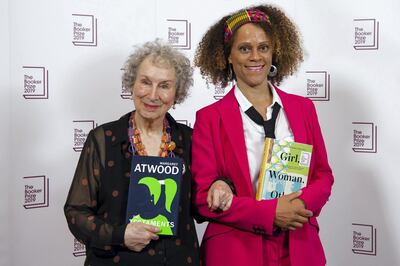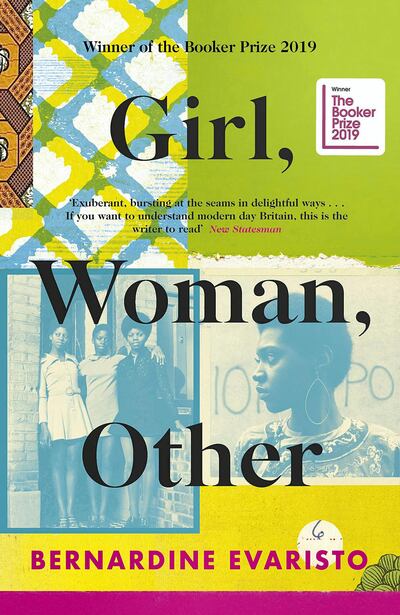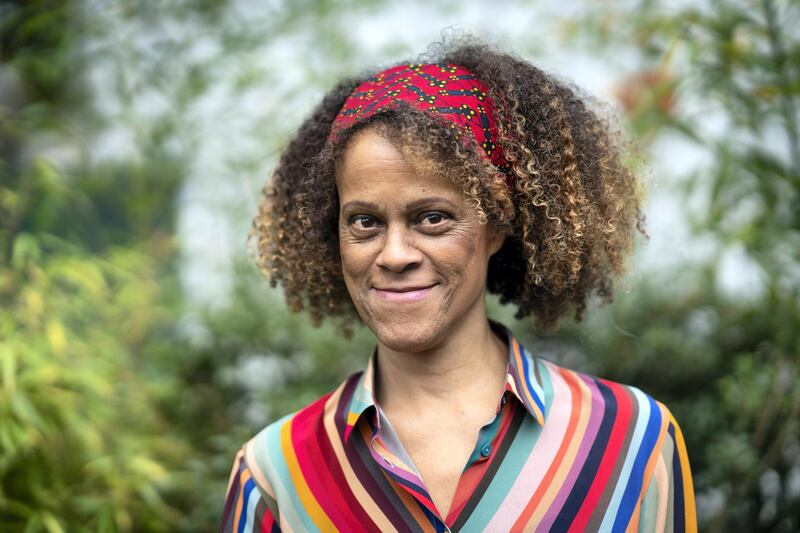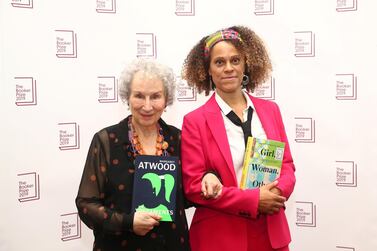She made history last year when she became the first black woman to win the prestigious Booker Prize in its 51-year history. However, the spotlight wasn't purely on Bernardine Evaristo's accolade – for the Girl, Woman, Other author was not the only winner.
In October, it was announced the award would be shared for the first time in two decades. Margaret Atwood's long-awaited follow-up to The Handmaid's Tale, The Testaments, claimed the top spot alongside Evaristo's work.
The decision raised larger questions about the importance of celebrating female black authors .
"I think the fact it became a controversy wasn't a bad thing because it kept it in the news for a long time and it still comes up today," Evaristo says from her home in London. "And the controversy is not against me, so that's also heart-warming. The book has done so well – it's selling really well – and the Booker has made many things happen for it. The translation rights that hadn't sold beforehand are now sold into 20-something territories; that all happened within weeks of winning. That people are reading it and it's selling is all because of the Booker, so I only see it as an entirely positive experience."
Evaristo may be riding a career high, but the Booker is a well-deserved affirmation for the author who for 26 years has written stories with women and people of colour at their heart.
Girl, Woman, Other is her eighth published book and is written in a unique, hybrid form that falls somewhere between prose and poetry as a result of her exploration of writing both over the years. She calls it "fusion fiction". The book tells the polyphonic story of 12 interconnected characters, most of whom are black, British women, spanning social classes and set across three generations from ages 19 to 93.
"I don't think 93-year-old black women come into the consciousness in any way, so I wanted to create a character who would go against the typical stereotypes," she says of Hattie, the book's oldest protagonist. "I wanted her to be strong; I didn't want her to have dementia, and I wanted her to be living an independent, full life. I wanted her to have had a rich life."

Raised in the 1960s and 1970s with a white British mother and a black Nigerian father who arrived in the UK after the Second World War, Evaristo, 60, has carved her niche in the literary world as a thoughtful, poetic and poignant storyteller.
She is also a long-standing activist for inclusion in the arts, having initiated several projects to address the under-representation of people of colour.
From co-founding the Theatre of Black Women in 1982 to initiating the Brunel International African Poetry Prize in 2012, Evaristo’s work goes well beyond the page.
"I've always been very much an activist even before we called ourselves that," she says, explaining that she has set up arts initiatives for people of colour in places in the UK that lack them. She set up the Brunel International African Poetry Prize to promote African poetry because "it simply wasn't being published".
"I've always taken on the responsibility of not only developing my career but also supporting other writers, and the Booker doesn't change that," she says. "What changes is the way in which I'm being heard globally. I have a bigger platform. I know it's become a cliche but it's true – I do have a bigger platform to be heard when I say things."
Evaristo's bigger platform meant her winning novel made its way into the hands of Barack Obama, who at the end of last year listed it as one of his top books of 2019.
As we wind down 2019, I wanted to share with you my annual list of favorites that made the last year a little brighter. We’ll start with books today — movies and music coming soon. I hope you enjoy these as much as I did. pic.twitter.com/l5qTGkAPok
— Barack Obama (@BarackObama) December 28, 2019
"It was almost as good as winning the Booker, to be honest," she laughs, reminiscing about the night she found out – along with everyone else – thanks to the former US president's Instagram post. "I could just imagine him sitting in bed in his jim-jams with my book and I felt so excited that I'd communicated with Obama though my work. I was absolutely overjoyed."
Despite Evaristo's powerfully feminist writing and activism, a common theme between her and Atwood's winning novels is that both could be seen as critiques of feminism. One character in Evaristo's novel, Dominique, protests that: "It's fashionable to be a feminist these days: blogs, demos, crowd-funder campaigns. I can't stand it."
The fictional conversation was borne from discussions Evaristo had many times with friends. “Feminism is one of the most important social issues that we face in the world today, so my feeling is that it’s great that it’s come up for a fourth wave and it’s great that young women are blazing their own trails as feminists,” she says.
1/ A week ago I won the @TheBookerPrizes with @MargaretAtwood & have since been in a whirlwind of press interviews & events. Firstly, MASSIVE THANKS to my editor, Simon Prosser @HamishH1931, who published me for nearly 20 years before I broke through & to the team @PenguinUKBooks pic.twitter.com/y1LR1hVHy3
— Bernardine Evaristo (@BernardineEvari) October 21, 2019
"But it's also important that we acknowledge feminism started a long time ago and that there's history and legacy to it that we must also acknowledge. We must always be hyper-vigilant about feminism being co-opted for fashion purposes and defined by the media because it's fashionable. Because things that are in fashion go out of fashion."
When it comes to authors tackling issues of female empowerment with skill, Evaristo praises the work of fellow Booker Prize nominee Elif Shafak. Currently favoured on her bookshelves are two novels by the Turkish-British writer – Three Daughters of Eve and 10 Minutes and 38 Seconds in this Strange World.
"I guess she's not really classified as Middle Eastern, but I do think she's a very powerful writer," Evaristo says. "What I love about Elif Shafak is that she's a beautiful writer and a very strong, woman-centred writer. She's not afraid to deal with political issues, feminist issues, but she does it through the most beautiful, atmospheric and descriptive and moving storytelling. So she's top of my list."

But female empowerment hasn't always been the driving force behind Evaristo's prose. Her first work, a book of poems, Island of Abraham, published in 1994, was inspired by travels as a young adult that took her to Egypt and Madagascar, among other countries. In the late 1980s, she drove from London to Turkey, and on to Iraq and Kuwait with a friend. In August 1990, Saddam Hussein's invasion of the latter started the First Gulf War.
She admits to having been clueless about the region's political climate back then (this was pre-internet, Wi-Fi and mobile phones) and admits they had a lucky escape. Yet, the trip inspired her 2004 novel-with-verse, Soul Tourist, which fuses prose, poetry and script-like form as it follows two characters on a road trip through Europe and the Middle East.
As this is Evaristo's first trip to the UAE, might the Middle East inspire some of her future work? "It's a flying visit, I'm afraid, like always these days, but I'm excited to see Abu Dhabi and take in as much as I can."
Bernadine Evaristo will be at Hay Festival Abu Dhabi, Saadiyat Island, on Thursday







